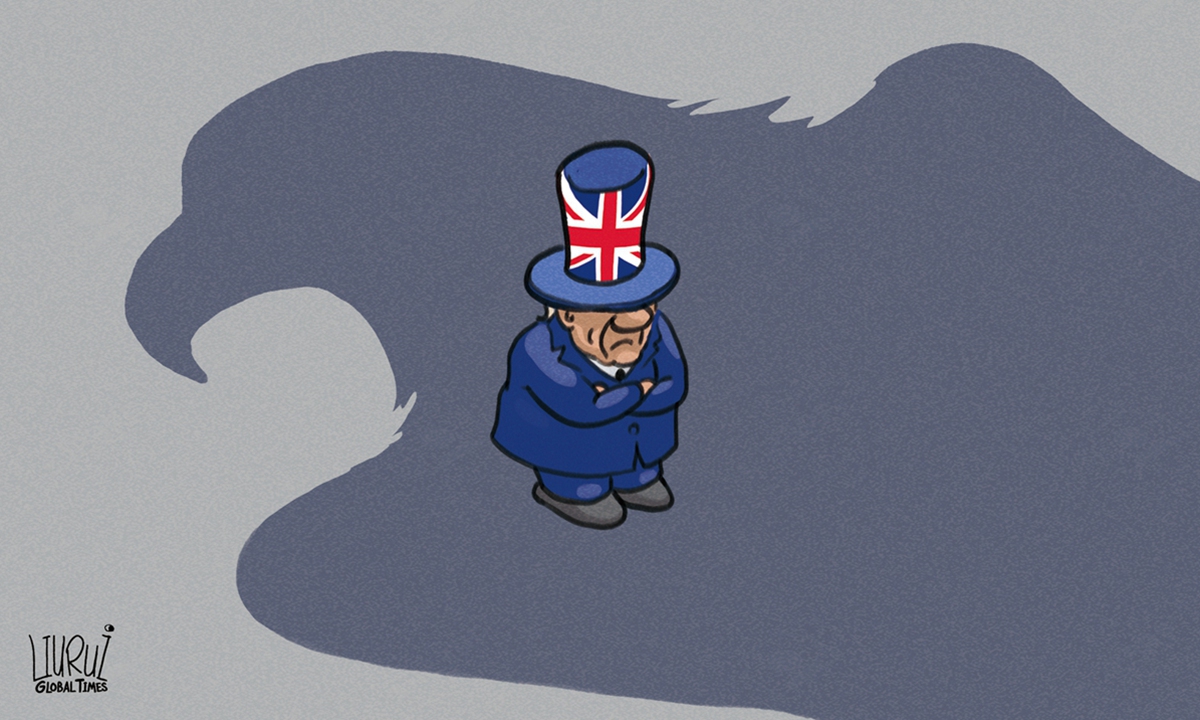
UK US relations Illustration: Liu Rui/GT
For many centuries the UK was renowned for ruthless but stable and effective policy - its international nickname "perfidious Albion" testifying to ruthlessness and creating the largest Empire in world history to effectiveness.
There could therefore scarcely be a greater contrast to the chaos gripping British politics this year - making it almost an international laughing stock. The UK has had three prime ministers in one year. The first, Boris Johnson, was ousted after a police investigation over breaking his own lockdown laws. The second, Liz Truss, held office for only 44 days before being ejected - the shortest premiership in British history. The third, Rishi Sunak, took office despite a few weeks earlier being rejected by a majority of members of the ruling Tory Party.
To add to the political meltdown, the UK had four chancellors of the exchequer in four months. One lasted merely 38 days - the shortest in British history, except for a chancellor who died in office. During that time, he introduced a disastrous budget causing a national financial crisis which brought down the Truss premiership.
After this mayhem, the ruling Tory Party has fallen more than 30 percent behind the opposition Labour Party in opinion polls.
The explanation of descent from ruthless political efficiency to farce is that the UK has become the most advanced case of the chaos that US policy is currently bringing to Europe - very logically, as the UK is historically the US' most loyal ally in that continent.
Europe's current disorder is self-evidently the worst since World War II. Inflation is at its highest in over 30 years, economic growth is the slowest since World War II, and a major war is taking place in the continent in Ukraine. Reflecting the resulting discontent, numerous European governments are deeply unpopular, independent of their political complexion. In addition to the UK, already analysed, in Sweden and Italy centre-left governments were replaced with major electoral gains for the extreme right, while in France the right-wing president suffered large loss of parliamentary seats to strongly left-wing forces.
This continent-wide chaos is directly due to US policies in Europe - many of which are created by pursuit of cold war policies against China. The UK's case is particularly acute because it followed the policies of the Trump administration in an economically irrational withdrawal from the EU in order to seek even closer links with the US.
Previously US policies in Europe were damaging but insufficient to destabilize the situation. For example, the US campaign to block Huawei's participation in Europe's telecommunications network, which succeeded in Britain, means the UK pays more for its 5G than necessary - damaging, but not powerful enough to destabilize Britain.
But US policies have now become sufficiently damaging to destabilize the European continent. First was the threat to bring Ukraine into NATO - which the US understood directly militarily threatened Russia and is the real cause of the Ukraine war. Directly, the US pursued this policy to weaken Russia - and Germany, by forcing it to buy expensive US gas instead of cheap Russian gas. But the US also sought to intimidate Russia into breaking off good relations with China. But instead Russia resisted these attacks on its vital national interests. US policy thereby created the biggest European war since 1945.
Second, the inflation destabilizing Europe was created in the US, not in Ukraine - as the chronology clearly shows. US inflation soared from 0.1 percent in May 2020 to 7.5 percent in January 2022, before the Ukraine war started - Europeans simply followed the US with a three-month delay.
US inflation was due to hyper stimulatory policies adopted in an unsuccessful attempt to keep up with China's economic growth. US money supply rose by 27 percent in a year, while the excess of government current spending over current income soared to 26 percent of GDP. This created a vast demand-side stimulus - US consumption rose by $3,436 billion between the last quarter of 2019 and the third quarter of 2022. But on the supply side, US net fixed investment fell by $52 billion in the same period. A massive demand surge, with no supply increase in supply, created the biggest US inflationary wave for 40 years - which inevitably spread into Europe.
As the British government refused to show independence from US foreign policy - it became the US' biggest cheerleader over Ukraine - both the British economy and its population suffered severely as they were hit by US inflation. British life expectancy is already falling, and average incomes are officially projected to fall by 7 percent in the next two years. Political mayhem, replacing the UK's historical competence, ensued.
The UK therefore became the first victim of the current chaos that US policy is creating in Europe. But unless European governments show some independence from the US, it will be far from the last.
The author is senior fellow at Chongyang Institute for Financial Studies, Renmin University of China. opinion@globaltimes.com.cn




